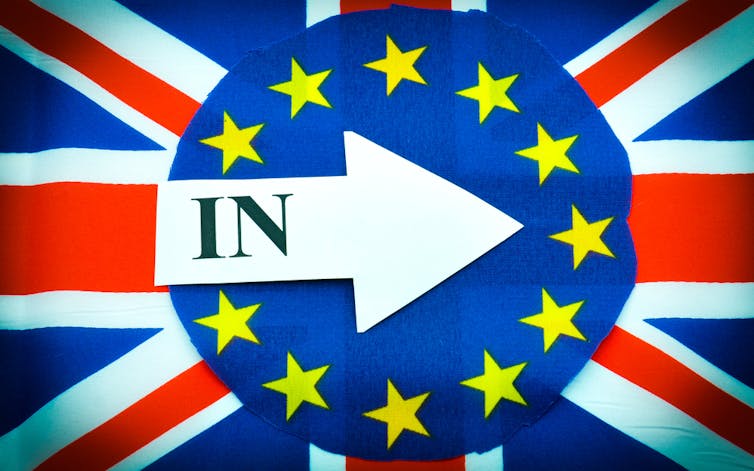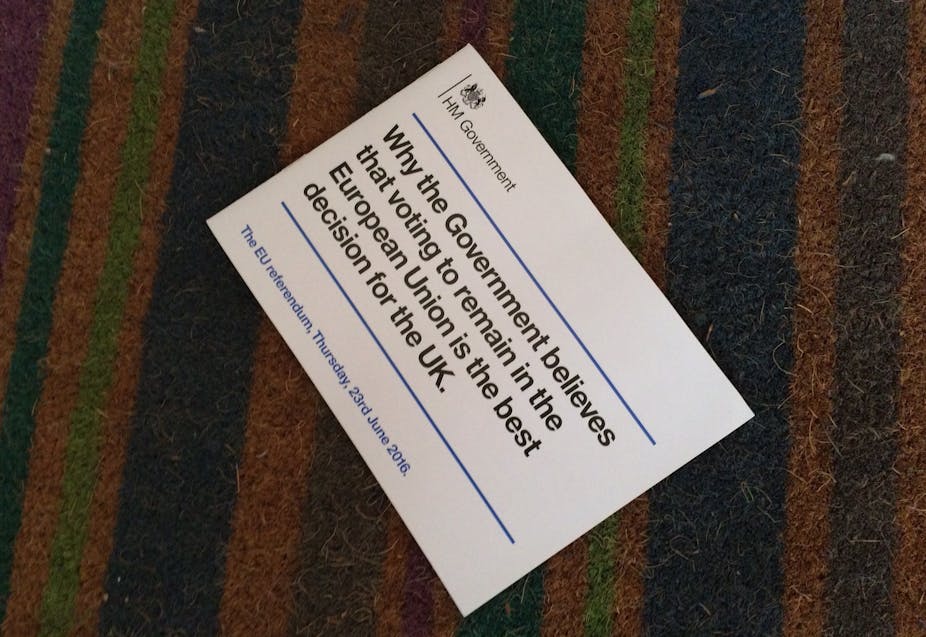The UK government is sending out a leaflet to all households in the country entitled: “Why the government believes that voting to remain in the European Union is the best decision for the UK.” Should we take its claims at face value or do they require a pinch, or more, of salt?
Special status
The government’s pro-EU message begins by reassuring voters that the UK has “secured a special status in a reformed EU”. It’s certainly a bold and eye-catching claim. But there are two elements that need to be scrutinised here: the nature of the UK’s EU membership and the way the EU has supposedly been reformed.
The UK already had a legally binding opt-out from the single currency and Schengen (passport-free movement zone), negotiated prior to the 1992 Maastricht Treaty and the 1997 Amsterdam Treaty respectively. Any special status dates back to this period, or even earlier to the permanent budget rebate negotiated by Margaret Thatcher in 1984.
Cameron’s renegotiation now adds a promise by the European Council to change the wording of the EU treaties at an unspecified point in the future to: “make it clear that the [treaty] references to ever-closer union do not apply to the UK”.
As this is the only formally UK-specific measure stemming from the renegotiation, it is quite a stretch for the government to claim the UK’s status has changed significantly.
A reformed union
There are plans for a new EU law allowing states facing a surge in immigration to restrict access to welfare for recent EU migrants, and another curbing the right to claim child benefit for children living abroad. In addition, EU leaders have accepted the principle that if a majority of national parliaments object to a proposed EU law the Council will refrain from passing it – the so-called “red card” idea. They also made a pledge to prioritise economic competitiveness, including a reduction in burdensome EU rules.

A lot of the above looks uncertain, given the amount of policy details still to be agreed and implemented. Nevertheless, such changes ought to be popular with British voters, even if it is more plausible to talk of EU reforms going in a UK-friendly direction rather than to claim the EU has been fundamentally reformed.
Costs of leaving
The government also wants to make clear that there are significant disadvantages to leaving the EU. One notable claim is that Brexit would be associated with higher living costs. It says: “If the UK voted to leave the EU, the resulting economic shock would put pressure on the value of the pound, which would risk higher prices of some household goods and damage living standards.”
The suggested cause is that an EU withdrawal would create uncertainty over continued UK access to the single market, thereby putting off foreign investment and weakening sterling. It cites a number of sources, including a March Office of Budget Responsibility report on the pound.
There are good reasons to accept this logic, especially in the short term as currency markets are extremely liquid meaning there can be great volatility. For instance, on the day the London mayor Boris Johnson declared his support for Brexit the pound lost nearly 2% of its value against the dollar. In this scenario, imports would become more costly, but by how much and for how long it is impossible to say.
The key to resolving uncertainty following a Brexit is whether or not Britain would keep access to the single market, which absorbs roughly half of UK trade. Here the government’s warning is that there is no free ride when it comes to negotiating with the EU from the outside. The leaflet says: “A more limited trade deal with the EU would give the UK less access to the single market than we have now.”
It is perfectly true that countries trading freely with the EU accept significant concessions such as free movement of people, budget contributions, and implementation of EU laws. It is also the case that trade deals are laborious and politically fraught as the leaflet highlights with the example of the seven years it has taken to finalise the deal with Canada. The UK’s lack of trade negotiators after Brexit would further complicate matters – this job has been delegated to Europe since 1973. But this is too delicate a point for the government to mention.
Verdict
In international politics, after the hard bargaining comes the hard sell. David Cameron talked up his eurosceptic credentials prior to renegotiating the UK’s relationship with the EU. Now the government is pulling out the stops – at a cost of £9m – by sending out this leaflet to every household.
But the glaring absence in the government pro-EU case is an overarching message about what European integration is for in the 21st century. The emphasis is solely on the transactional benefits of cooperation at an institution level, a choice of strategy intended to convince soft eurosceptics to vote for staying in.
But the risk is that this anodyne, accounting logic does nothing to counter the full-blooded rhetoric of those such as Nigel Lawson who say they love Europe but cannot see the point of the EU. The decision on 23 June will be about more than facts.
Review
Swati Dhingra, Assistant Professor, LSE
The Fact Check rightly raises two issues – what’s the alternative to membership and the vision for membership in the future, and has the government’s leaflet done enough to address the rhetoric around Brexit. Brexit would buy Britain greater economic sovereignty, but this will come at a cost of reduced trade, investments and incomes. Britain would be unlikely to get a special deal that maintained market access without conceding substantial economic freedom.
Britain is just a sixth of the size of the EU market and would find it much harder to attract significant trade partners alone or to negotiate better deals with large countries whose policies differ substantially from its own.
EU membership “magnifies” Britain’s standing in the world economy. But the leaflet downplays this to emphasise the rhetoric of Britain as a “strong, independent nation”. The verdict is right in saying that the leaflet is targeted towards soft Eurosceptics, who aren’t tied to the idea of freedom from Brussels at any cost. It tries to placate fears around immigration by explaining the benefit caps, but not the more divisive facts that EU immigrants make a positive contribution to the government budget and don’t really hurt British workers.

